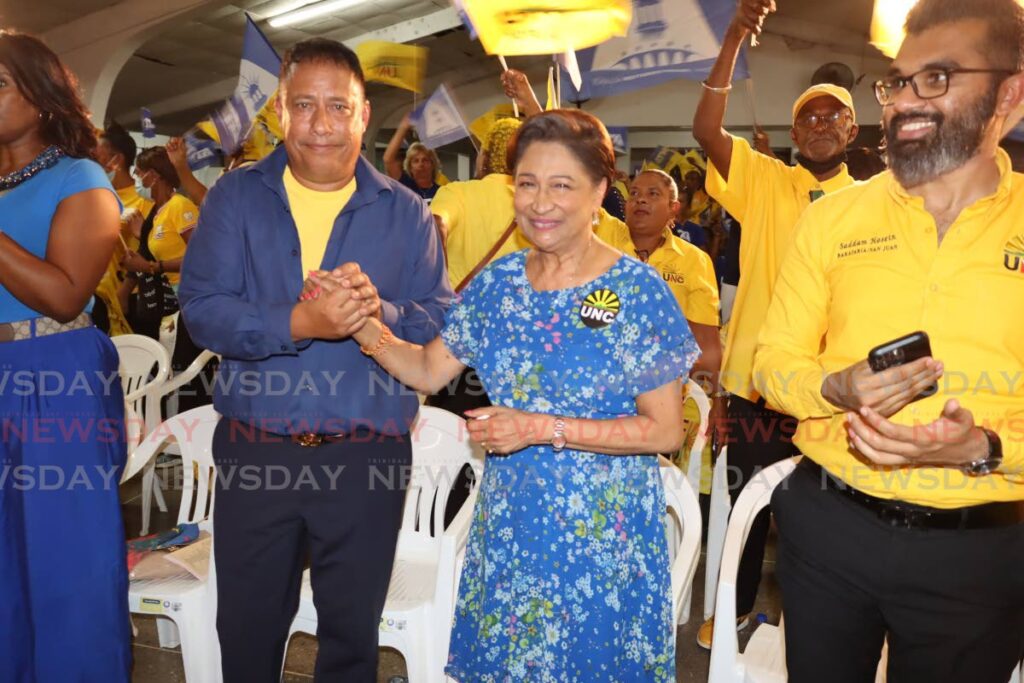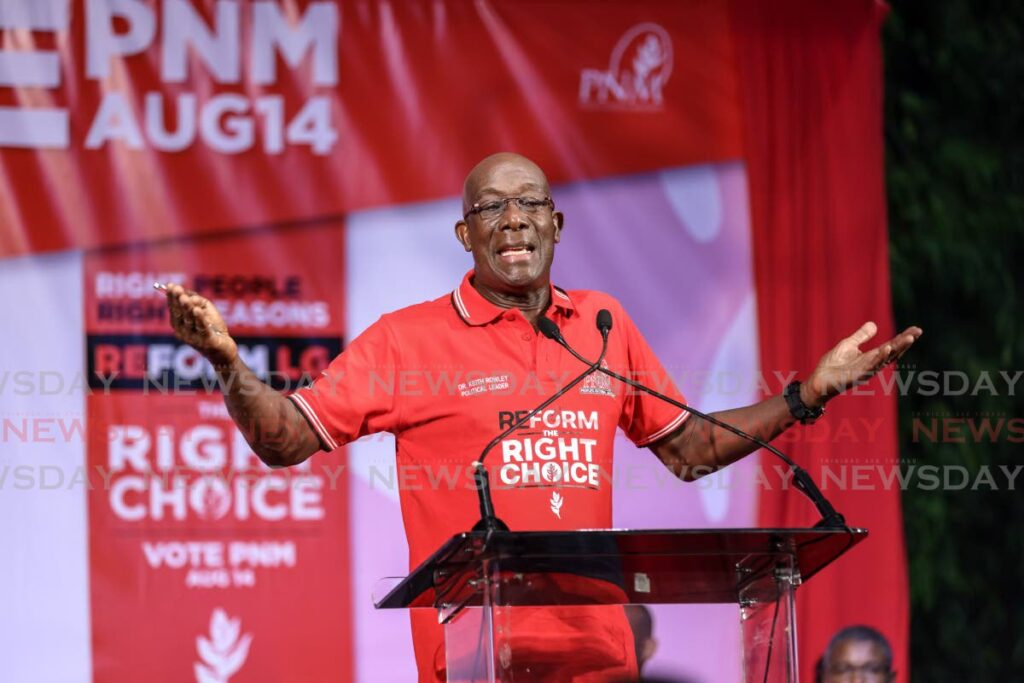Politicians behaving badly: Council urges parties to follow conduct code

Now that the 2023 local government election campaigns are in full gear, the Council for Responsible Political Behaviour has started monitoring the behaviour of the various political parties, although that monitoring is limited – the nine-member council gets most of its information from the media and direct complaints. It does not operate outside of election campaigning, nor does it directly monitor political rallies or meetings.
The council has already had to address three concerns coming from one speech given by the Prime Minister at a People’s National Movement Political (PNM) meeting on June 29.
One of the issues was brought to its attention by National Transformation Alliance (NTA) political leader Gary Griffith who described Dr Rowley’s remarks as race-baiting, inflammatory and divisive.
At the meeting, the PM questioned the United National Congress (UNC)/NTA proposed stand-your-ground law which would reduce home-owner liability in cases of self-defence against home intruders.
Rowley had said, "That they are going to give people of a certain race to shoot people of another race, because they are saying the crime in this country – which we know is across the board – is one race attacking another race."
Chairman of the council Dr Bishnu Ragoonath said the council members dealt specifically with Griffith’s complaint about divisiveness, sending out a statement that Rowley’s comments were “inappropriate and insensitive.”
They did not address any “personal attacks” made on Griffith at the same event, because that issue was not part of the complaint sent to them. But they dealt with the complaint even though the NTA was not a signatory of the council’s Code of Ethical Political Conduct.
The council also addressed claims of inducements being made to get party members to defect to another party, as well as smear campaigns against members of other parties. The council admitted it could not have carefully reviewed or investigated the claims, but reminded party members of the code to which they signed.
In the code, coalitions and their candidates agreed to a list of 20 “don’ts.” These include not offering any inducement or reward such as money, groceries or appliances, to get people to attend a public political event, join a party or vote for a party.
Parties should not make false or defamatory allegations against a another party, its candidates, representatives or members; or not use language or act in a way that may provoke violence, intimidate others or invite, encourage or foster hatred, resentment or any form violence.
They also should not criticise aspects of the private lives of candidates or their families who are not connected with the public activities of the leaders or candidates of other parties.
Ragoonath said the code asks that politicians focus on issues and policies for the development of society rather than personality and relationships, race, religion or sexual orientation, because after the elections citizens had to live and work together. He also expressed concern about politicians misusing and abusing their office.

“There have been concerns as to how State resources are being used on either side. We all know in the run-up to an election there is always a set of road paving and what not. Even though some people would like elections every year because they would get their road fixed, is that the right thing to do?”
“The code only comes into effect during an election campaign. When the Privy Council ruled and said the election must be held within three months of the date of the ruling of the Privy Council, which was May 18, we determined that to be the campaign period so that was the period that will be monitored.”
He said a position on the council is a voluntary one and members are not being paid to serve. He said the only funding the council ever received was years ago from the Roman Catholic Archdiocese under former archbishop Joseph Harris and the Sanatan Dharma Maha Sabha under the late Sat Maharaj.
“If we had to monitor the politics year-round to say the PNM or UNC do this wrong, then somebody would have to pay us and nobody is willing to do so.
“None of us, as far as I’m aware, attended any of the political rallies that have happened so far and we don’t watch it. What we will note is what is reported in the media (print, broadcast and social).
“But we also invite the citizenry at large, as well as the political parties, that if you all see something that raises a concern as to whether it violates the code, please report it to us. And if you’re reporting it to us, give us all the evidence.”
Hope for moral suasion
Ragoonath said in 2014, before the 2015 general election, several civil society organisations came together and decided they did not want the election campaigns to reach a state where it would divide society and create more problems. They drew up the Code of Ethical Political Conduct and presented it to the then five major political parties – the PNM, the UNC, the Congress of the People (COP), the Movement for Social Justice (MSJ) and the Independent Liberal Party (ILP). They asked the parties to review the code and endorse it if they were in agreement.
All the political parties signed, including the political leader and chairman of the PNM Dr Keith Rowley and the late Franklin Khan respectively, and the deputy political leader and chairman of the UNC at the time. A council was created with five people who were considered “independent enough” as well as one representative from each party. The council members then elected Ragoonath as chair. Their job was to monitor adherence to the code.
In 2019, the code was updated to “tweak a few things” and because, between 2015 and 2019, several small parties were created. They too signed the code but they all wanted a representative on the council.
“The main tenants remained the same, but to have a member from each party would have been unmanageable. So the main change is that we took out the representatives of the political parties who were sitting on the council and the founding organisations put in a nine-member council of nine independent members.”
In 2021, the council went to Tobago before the Tobago House of Assembly election and all the political parties there signed the code. He recalled the Progressive Democratic Patriots (PDP) deputy leader Farley Augustine signed on behalf of the party, so now there is a question as to whether or not the PDP is still a signatory of the code as Augustine resigned from the party.
Of the ten parties contesting the local government election on August 14, the PNM, UNC, MSJ, Unity of the People, Trinidad Humanity Campaign, and possibly the PDP are signatories. He said after nomination day, June 26, the council contacted all the parties, including those that were not signatories, sent them a copy of the code and made them aware the council was monitoring the election.
Ragoonath said the council is a civil society organisation and cannot penalise or sanction anyone for breaching the code.
“We hope that when we make a statement like this, there will be moral suasion. Also, by making it public, by putting out a statement, we are saying, ‘citizens of TT, be careful of who you vote for because bear in mind that your leadership would have signed on and endorsed a code. And if they are willingly breaching that code, you think about it when they make their manifesto promises to you, what they will do.’ And we leave it there.”
He said except for the leadership, he had seen some reduction in “mud-slinging” and personal attacks among the parties’ candidates, but there had not been any marked improvements over the years.
However, he said when the council was set up, the stakeholders let the council members know not to expect the election culture to change overnight and not to give up as they hoped to see significant change in the long run. In addition, he said citizens like the picong and bacchanal so they knew there would be resistance to change.
He said part of the problem was the council’s inability to widely publicise the code because of a lack of funding. At one point, council members held two half-day workshops for sixth form students, but they would have liked to have community meetings to educate the public on the code either before or after an election season.

Comments
"Politicians behaving badly: Council urges parties to follow conduct code"